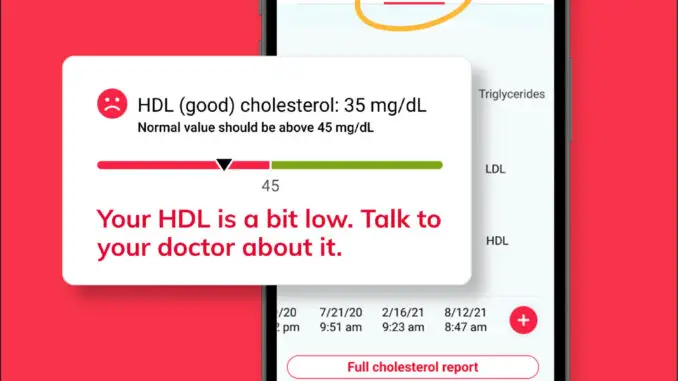
What You Should Know:
– Hello Heart, the only digital therapeutic that focuses exclusively on heart health, today announced a new cholesterol management feature, designed to empower people to improve their heart health
– The first-of-its-kind, Hello Heart’s ‘My Cholesterol’ allows users to easily track and understand their cholesterol levels, and provides personalized insights based on peer-reviewed, published recommendations, encouraging them to make positive lifestyle changes to improve their health.
Using Technology to Improve Heart Health
Hello Heart is the only digital therapeutics company to focus exclusively on heart disease, the leading cause of death for U.S. adults. Through a connected device and mobile app that uses AI, behavioral science, and personalized digital coaching to drive lifestyle changes, Hello Heart empowers people to embrace healthier behavior, which can reduce the risks of high blood pressure and heart disease.
Powered by behavioral science and personalized digital coaching, ‘My Cholesterol’ brings Hello Heart one step further in the company’s mission to empower people to have a holistic understanding of their cardiovascular health and how it can be better managed. The addition of cholesterol-centric capabilities makes Hello Heart the only solution in the market that looks to manage all key heart health disease factors – blood pressure, cholesterol, and diabetes. Through a connected device and mobile app, and using AI-based technology, Hello Heart helps people make better lifestyle choices by tracking blood pressure, pulse, medications, weight, activity, and now also cholesterol levels. Making small changes and forming healthier habits may help reduce blood pressure, cholesterol, and heart disease.
Why It Matters
Today, cholesterol lab results are typically scattered between doctor’s offices, different labs, hospital records, or biometrics screens in many patient portals, making it hard to track and visualize trends over time. With Hello Heart’s new feature, users can easily import their cholesterol levels from across the care continuum. The app also sends alerts to users reminding them when to get tested next, and enables easy scheduling at nearby clinics. Users have a simple view of their cholesterol trends over time, alongside personalized explanations of their lipids panels, which can be tricky to understand.
The feature also includes digital coaching specific to cholesterol focused on lifestyle changes that users can adopt to better manage their levels. Rather than traditional, general advice typically given to patients with high cholesterol, ‘My Cholesterol’ leverages AI to provide optimized, clinically-based, practical insights and tips.
Another key benefit of ‘My Cholesterol’ is its ability to help employers to move the needle on health equity and women’s health initiatives. There are significant health disparities when it comes to heart disease – in fact, the deadliest gap in care for women is heart health, and women’s mortality rate for heart attacks is 2x higher than men’s. Like many other aspects of heart health, the normal range of cholesterol readings, specifically high-density lipoprotein (HDL), is different for men and women, which is why Hello Heart’s new cholesterol feature provides a personalized, born-gender-based view of readings.
“Managing all risk factors that contribute to heart disease is crucial to keeping the pump and pipes of our cardiovascular system healthy. Cholesterol, along with hypertension, are critical risk factors for heart disease that are typically not well managed,” said Dr. Sanjeev Aggarwal, Medical Advisor at Hello Heart and former Chief of Cardiovascular Surgery at Beaumont Health. “Fortunately, behaviors and lifestyle choices can have a significant impact on improving high blood pressure and high cholesterol levels. Hello Heart is the first platform of its kind that is empowering users holistically in all aspects of their heart health. Giving users the ability to track, understand, and manage risk factors over time is critical to battle against cardiovascular disease, which remains the number one killer in our country for both men and women.”